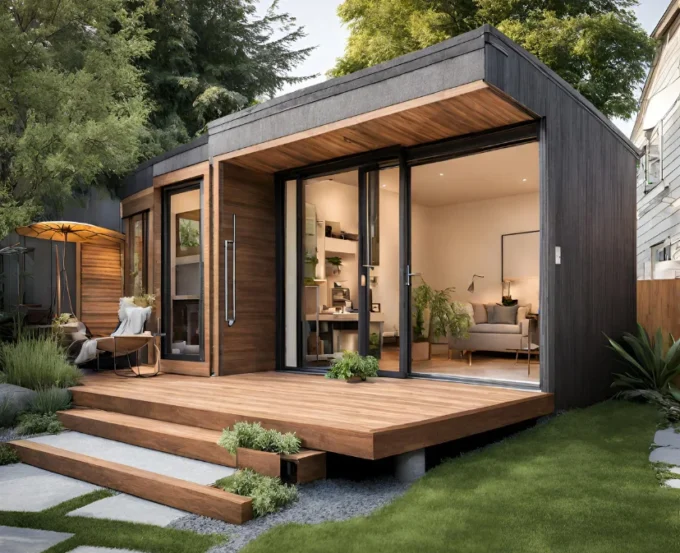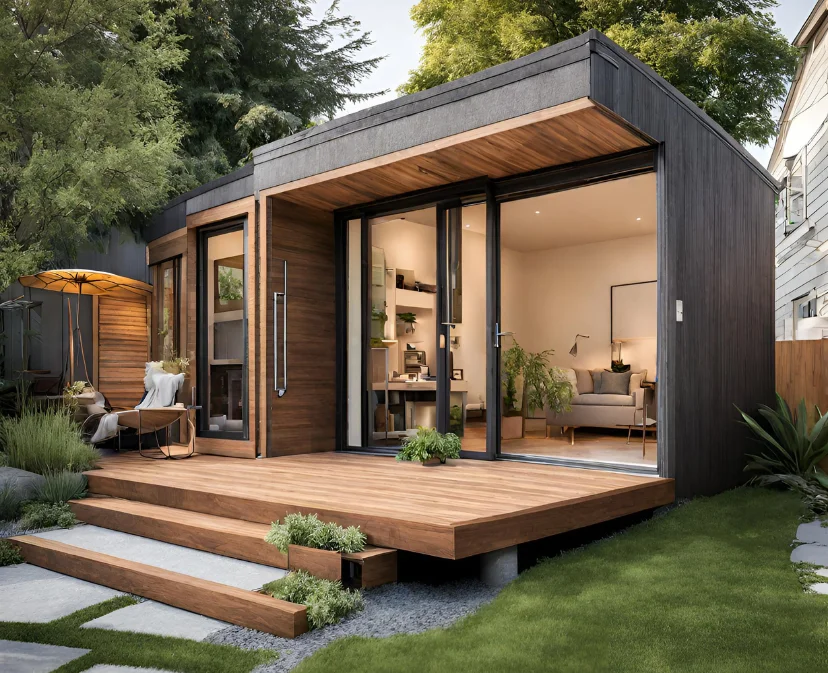Accessory Dwelling Units (ADUs) have evolved beyond just being additional living spaces. In an era where flexibility and efficiency matter most, many see the potential of transforming their ADU into a fully functioning business hub. With the right approach, you can convert your ADU into a thriving workspace that supports professional growth and profitability.
Key Points
- Assess zoning laws and business permits.
- Maximize the available space for productivity.
- Invest in top-tier technology and equipment.
- Create a clear, professional aesthetic for clients.
- Consider sustainable and energy-efficient solutions.
1. Assess Legal Requirements
Before any structural change or transformation, check local zoning laws. Not every area allows for commercial operations inside an ADU. It’s vital to understand what types of activities are permissible, and what permits are needed to ensure everything runs smoothly.
The process of securing a permit for a business hub inside an ADU can vary significantly from city to city. Be prepared for the possibility of restrictions on client visits, noise levels, or parking. Starting on the right side of regulations will prevent costly delays or legal issues later.

2. Strategic Design and Layout
You want a design that promotes efficiency without crowding the environment. Focus on smart storage solutions and multi-functional furniture. Space segmentation is crucial. Consider separating workspaces into functional zones—one for client meetings, one for operations, and one for admin tasks. This division helps boost focus and productivity, creating an environment conducive to running a smooth operation.
For those requiring customized ADU solutions, ADU builder experts from OCA Builds can provide design guidance tailored to your needs. Their experience helps optimize every square foot while maintaining a professional atmosphere.
3. Invest in Technology
A successful business hub requires state-of-the-art technology. Start by installing a reliable internet connection. A professional-grade router and a mesh Wi-Fi system may be necessary, depending on your space’s size. If multiple people will use the ADU, consider investing in network equipment that supports heavy data flow.
Consider adding smart solutions for lighting, security, and HVAC systems. Smart thermostats can help control energy use, while intelligent lighting solutions improve workspace aesthetics. For those dealing with confidential information, installing a robust security system—both physical and digital—is essential.
4. Professional Aesthetic
Your ADU’s design reflects your brand. Whether it serves as an office, creative studio, or consultation space, the appearance sets the tone for clients. Neutral, calming colors work well for professional environments. Clean lines and minimalist décor help maintain focus without distractions.
Invest in ergonomic furniture, from desks to chairs, to ensure comfort for you and any potential clients. Natural light enhances the working environment, so capitalize on windows and glass doors. If privacy is required, invest in high-quality blinds or curtains that allow control over lighting and visibility.

5. Energy Efficiency
Running a business hub can increase electricity use, so it makes sense to invest in energy-efficient solutions. Install energy-saving appliances, lighting, and insulation to reduce monthly bills and your environmental impact.
Solar panels, where applicable, offer an excellent way to power your hub without increasing utility expenses. Investigate state or federal incentives for green energy adoption—many programs support small businesses adopting sustainable practices.
6. Meeting Client Expectations
First impressions matter. Your clients need to see a professional atmosphere the moment they step in. Consider adding a small waiting area with comfortable seating if space allows. Offering refreshments, such as a coffee machine or water cooler, gives clients a welcoming touch.
If your business involves presentations or visual work, a high-quality monitor or projector may be necessary. These tools can help you communicate your ideas effectively, improving client relations and leading to better business outcomes.
7. Insurance and Liability Coverage
Operating a business from an ADU opens up new liability concerns. Ensure your insurance policy covers commercial activity on the premises. This step is essential if clients or employees regularly visit the space.
You may need specialized insurance to cover expensive equipment or inventory stored in the ADU. Consult with an insurance expert to determine the appropriate coverage for your operation.

8. Marketing Your Business Hub
After your ADU is fully operational as a business hub, it’s time to attract clients. A professional website is a must. It serves as your business’s online face, showcasing your services, location, and expertise. Investing in search engine optimization (SEO) can also improve your visibility online.
Social media plays a significant role in modern marketing. Share behind-the-scenes photos of your new workspace or provide insight into your daily operations. It creates a personal connection with your audience, humanizing your brand and strengthening client relationships.
Networking is also essential. Reach out to local businesses or attend industry events to spread the word. Business hubs often thrive through connections, and collaborating with other local professionals can open doors to new opportunities.
9. Flexibility for Future Growth
An ADU turned business hub may eventually outgrow its original purpose. Keeping your layout flexible allows for future expansion. If the demand for your services increases, you may need to hire additional staff or expand the workspace. Design your ADU to accommodate that growth. Movable walls, multi-functional spaces, and modular furniture allow you to adapt as your needs evolve.
Future-proofing your business hub includes setting aside room for additional technology upgrades or storage solutions. This foresight prevents the need for costly renovations down the line and ensures that your hub can scale alongside your business.
10. Tax Benefits
Operating a business hub out of an ADU can offer tax advantages. Depending on local tax laws, you may be able to deduct a portion of your property expenses, including utilities, insurance, and mortgage interest. Always consult with a tax advisor before assuming any deductions, as the rules can vary by location.
Some regions may also provide additional incentives for green building features, like solar panels or energy-efficient appliances. Combining these tax benefits can result in significant cost savings over time, making your ADU hub even more profitable.

Conclusion
Transforming an ADU into a fully functional business hub requires careful planning, investment, and creativity. Every aspect—from legal requirements to space optimization and client experience—contributes to creating a thriving environment for professional growth. With the right strategy, an ADU can become a key part of a successful venture, offering the flexibility and convenience that modern businesses need.
If you’re considering converting your ADU, start by addressing zoning laws, investing in technology, and creating a space that reflects your professional values. With expertise and support from experienced contractors like OCA Builds, the process becomes smoother and more effective, paving the way for a productive, well-structured business hub that can serve you for years to come.






